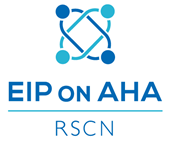EIP on AHA “Profiling Motivation Application prototype”
The problem of acceptance and usage of different technological solutions by an older person is rather well-known. Despite the fact of the positive impact of implementing of ICT solutions to the level of security and to the quality of supplied care, older people are rather reluctant to change their traditional way of life.
The Profiling Motivation Application has been developed as a result of the collaborative work on “Personalizing eHealth services on the basis of individual motivation” between the EIP on AHA Action Group C2 (Independent living solutions) and D4 (Age-friendly buildings, cities and environments).
“Older persons may not have a sufficient understanding of the costs and the benefits of personal eHealth services, says Gottfried Zimmermann, Professor of Mobile User Interaction at Stuttgart Media University. In particular, they do not understand how these services would improve the quality of their lives by assisting them in living an independent life. Also, it is important that they understand the costs of personal eHealth services, not only in terms of money, but also in terms of what personal data they share with the services and what the services do with these data. User-centred eHealth services should be designed to establish a trust relationship between the service provider and the users. The EIP-AHA Privacy Preferences for Active and Healthy Ageing document has been jointly developed by the Action Groups C2 and D4. This document provides guidance on how to design personal eHealth services with a user-centred data management approach, giving the user a choice on how to handle their personal data.”
The domain of “persuasive systems”, technologies that aim to change the end-users’ behaviours or attitudes, like eating healthier or increasing physical exercise, is not new and it is widely used by creators, for instance, of web-applications. The original idea was not to develop a new persuasive scheme, but to make the profiling framework, that will allocate any older person to one of the predefined profiles and to develop the set of personalized strategies of persuasion for each of these profiles. These predefined profiles should group people that have the same motivation to work on their health.
The aim of the solution was to allow the allocation of a person into one of the applicable motivation profiles (as elicited after a large-scale validation of a motivational overview for engaging in sports), and then, to provide the persuasive strategies that are most effective for each profile (personalized strategies).
EIP-AHA Privacy Preferences for Active and Healthy Ageing document, opens in new window
Further information:
